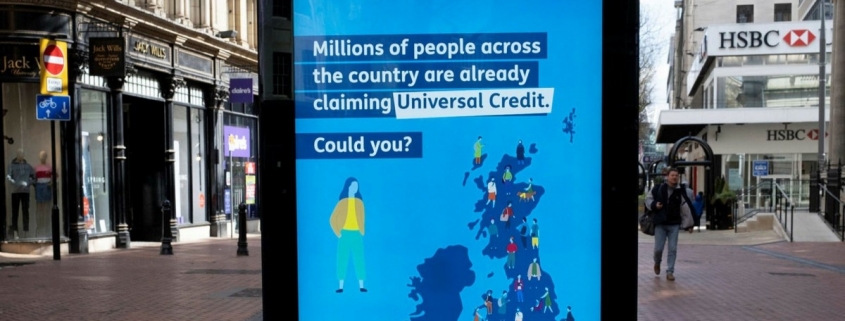Uk gov reimposing sanctions to those claiming benefits
This instantly sounds like a terrible idea. Ending the “something for nothing” loophole abuse in which some people live entirely through benefits without bothering to seek a job sounds truly asinine in a time in which as much as people might want to work, there are simply no jobs to be had.
Whatever qualifiers must be shown to demonstrate a job-seeking initiative may not even be allowed due to enforced community distancing guideline.
And yet, it may not be that simple. As much as the UK government is indeed often a fount of terrible ideas, there are still often reasons why they do they things they do. Let us try to uncover their reasonings why.
What normally gets sanctions imposed on the unemployed?
The UK’s out-of-work benefits have long been framed in terms of responsibilities and rights, from which derives a system of conditionality and sanctions. The state expects its beneficiaries to do certain things as a condition for receiving out-of-work benefits, and failure to do these things as the consequence your benefits may be stopped. The state has no interest in pursuing a “something for nothing” culture of welfare.
If you are claiming –
- Universal Credit
- Income Support
- Jobseeker’s Allowance
- Employment and Support Allowance
You should have a document called a claimant commitment entailing your responsibilities to continue receiving benefits. If you don’t have such a document you may have been given a Job Seeker’s Agreement, action plan, or an appointment letter that makes similar specifications.
Welfare recipients are obligated to various ‘conditions’ when admitted to state support, including
- Conditions of category: in which entitlements are conditional being a member of a defined category meriting support (being unemployed, disabled, homeless, etc.);
- Conditions of circumstance: in which individuals may be included or excluded based on their circumstances (passing a test of means, having achieved personal circumstances that no longer qualify them as needing support, or demonstrating that they have a particular need);
- Conditions of conduct: in which there is a requirement for a particular pattern of behavior from welfare recipients.
If you fail to accomplish the terms in your claim, usually to make an effort to seek a job and to engage with interventions, interviews, and observed word preparatory activities. Claimants may find their allowances cut by 40% to 100% for a minimum of 7 days for failure to meet work related activities and interviews, to 28 days for failure to undertake reasonable action to obtain work, and minimum of 91 days for an offense like a failure to take up an offer of paid work – all for the first offense.
Increasingly, people are being denied benefits on factor of conditions of conduct. Over punishment such as sanctions and denial of benefits are paired with more subtle means like intervention, persuasion, and social pressure have been used to encourage welfare recipients in particular ways.
Sanctions possibly a violation of the EHCR
This is not the first time that the UK government’s stance has been criticized as potentially unjust. The Economic and Social Research Council (ESRC) funded a research study – ‘Welfare Conditionality: Sanctions, Support and Behaviour Change’ – conducted by six UK universities.
Among key finding was that benefit sanctions did little to enhance people’s motivation to prepare for, seek, or enter paid work. They instead routinely trigger profoundly negative personal, financial, health and behavioural outcomes and push some people away from collectivised welfare provisions.
Imposing sanction can sometimes drive someone to destitution and adversely impact their ability to find work, which is counter-productive to the aims of the program.
Evidence suggested that benefit sanctions were often triggered for relatively minor transgressions such as being a couple of minutes late for a Jobcentre Plus appointment. On some occasions benefit sanctions were clearly inappropriately applied in spite of an individual’s best efforts to avoid them.
“I had an appointment with them, I phoned them saying that I’ve got a problem… my brother who died in [location] and I’m there it’s the burial ceremony, you understand?… They said, ‘No don’t worry, if you come back, just call us back’, and then ten days, I phoned them back… They say, no, they have to send it to the decision board to see and then they send me a letter after saying that I have to be sanctioned… that wasn’t human.” (MIGRANT, FEMALE, ENGLAND, UC RECIPIENT, WAVE C)
Researchers reported that the effects of welfare sanctions and conditional support trended to be “profoundly negative”. According to Project Director, Professor Peter Dwyer from the University of York’s Department of Social Policy and Social Work, “The common thread linking stories of successful transitions into work, or the cessation of problematic behaviour, was not so much the threat or experience of sanction, but the availability of appropriate individual support.”
“I got a sanction for not going to an interview. I got sanctioned for a month… It made me shoplift to tell you the truth. I couldn’t survive with no money.” (WSU, HOMELESS, MALE, ENGLAND)
While another reported:
“When I used to feel really low, I used to hit the bottle. Now… I’ll just ring [support worker] up and he’ll say, ‘Right do you want to come to speak to someone?’ Which is great… I’ve never felt more confident. I’ve got a job interview… through these guys… fingers crossed, I’ll be off benefits and back on proper money. Yes, that’s all I want.” (WSU, OFFENDER, MALE, ENGLAND)
The report further stated that respondents commonly regarded Jobcentres and Work Programme (WP) providers as being primarily focused on ensuring compliance with the mandatory benefit claim conditions rather than helping people into work. Pressure to achieve more demanding job application/work search requirements coupled with the recipients’ strong desire to avoid the punitive effects of a sanction resulted in people applying for jobs they had no realistic chance of getting. Intensified welfare conditionality therefore encouraged a culture of counterproductive compliance and futile behaviour that got in the way of more effective attempts to secure employment.
“My job was solely to prove to that woman [referring to Work Coach] that I had applied for so many jobs, and that was it… whatever jobs were available. Whether they were suitable for me, whether I was suitable for them, whatever, it didn’t matter.” (UC RECIPIENT, MALE, ENGLAND, WAVE B)
Many respondents stated that they felt criminalized for applying for universal credit and one stated that the threat of sanctions was unnecessary because he is keen and active to find work: ‘I want to find a job. I don’t need people to tell me what I have to do and threaten me with taking money off if I don’t do it. I want to find a job as quickly as I can.’
His experience is that the frequent threat of tough sanctions was not balanced with effective support to find a job: “The Jobcentre used to try and help you find work, you’d go in and they’d get on the computer and say ‘Oh we’ve got that many jobs today’. That doesn’t happen anymore. They don’t really help you to find a job. They just help you to sign on every two weeks. You know, you go in and they say ‘Right, come back in two weeks’… They don’t really help you to find a job anymore.”
Comparing Universal Credit and Job Seeker’s Allowance, it was found that there was double the amount of sanctions imposed under UC than JSA.
In defense, the DWP spokesperson stated that “This report completely fails to recognise that there are near record numbers in work and that the number of benefit sanctions has fallen dramatically.
“It’s only right that there are conditions attached to receiving benefits.”
A Dip Back to the Gloomy Normal
The UK’s social security system has managed to get emergency funds to tide over most of everyone left unemployed by the pandemic largely by gutting everything else in the system. No more checks, no inquiries, no standards – if you apply you get your claim.
The coronavirus was a death knell for the UK’s gig economy. Employees with zero hour contracts, easy to hire, easy to fire – abruptly a million of them were suddenly out of work and five million more self-employed workers found themselves in the same boat. The Universal Credit remains the only way for many to sustain themselves, and the surge in claims had forced the DWP to reassign workers simply to process claims.
It saved millions from the uncertainty of being able to feed themselves and keep their homes. The saying that many people are merely a single pay slip away from poverty is an old one, but true. People who file claims aren’t shirkers who prefer not to work – many would rather actually earn their living wage – but simply left unemployed due to circumstance.
And there is no way to correct themselves out of these circumstances. The novel coronavirus has proved the inherent fragility of this system that is determined to catch out parasites at every turn.
So Why Reimpose Sanctions?
Because Job Centres are reopening and it is part of procedure that sanctions are a part of the conditions for receiving Universal Credit and other unemployment assistance.
According to the DWP:
“Now our focus is rightly switching to Getting Britain Back into Work. From July, people can make an appointment with their work coach if they can’t get the help they want online or over the phone and work coaches will be calling all claimants to help them get ready for the world of work.”
It is clear what the government fears. Thousands of workers are losing their jobs and devasting whole swaths of the economy as many fear to return to work and employers dismiss those they cannot support in the face of reduced costumer presence. Already 5.2 million are claiming Universal Credit and unemployment is rising at exponential levels. The fear is a mass unemployment unseen since the 1980s and perhaps even the Great Depression.
In exchange, people have to go through hoops applying for jobs that are simply not available and vulnerable people like the physically and mentally ill are forced to show up into risky floorspace rife for contagion and a dehumanizing regime in job centers. The main beneficiary for the benefit system would ironically be the people directly employed by the benefits system to push the bureaucracy, not the destitute and the out of work. Jobs are made on the backs of those seeking jobs.
And via job-seeking rituals, it can be said that unemployment is under control and the economy might be on the road to reopening. Mayhaps this would invite consumer confidence again if it is said often enough.
Yes, it is illogical. But no one ever said the reason had to make sense, only that there is a reason.
–
For help with employment issues, Hadaway & Hadaway solicitors north east




